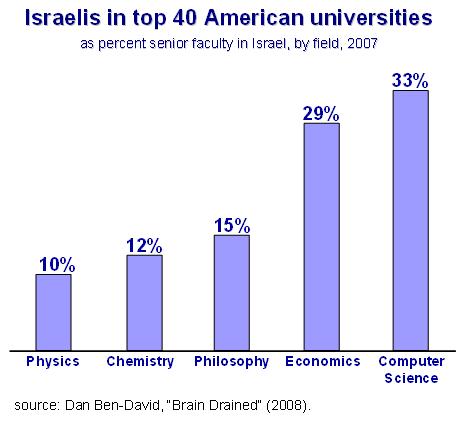|
PDF file
published
in Haaretz on March 11, 2008.
Canary in the Academic Mine
by Dan Ben-David To a certain degree, the recent
faculty strike and the Shochat Commission report that preceded it exposed a
number of increasingly problematic issues faced by Israel's academic
institutions. But both dealt with only
on the tip of the iceberg. Many years ago, coal miners would
enter the mines carrying a cage with a canary.
In the event of poisonous gas leaks, the canary’s demise provided the
miners with an early warning of imminent danger. In Israeli academia, the brain drain from
Israel’s universities plays the role of the canary. It is important to distinguish between
symptoms – e.g. the brain drain – and the actual problem: the state of Israel’s
universities. The number of European professors in
American universities ranges from one to four percent of all senior academic
staff in the professors’ home countries.
The magnitude of this brain drain has begun to cause considerable
concern in the European Union. But if
Europeans are worried about the migration of their academics to the States, then
Israelis should be nothing less than alarmed.
The number of Israeli scholars in the U.S. represents one-quarter of the
total senior faculty in Israeli academia (including the non-research colleges). The outward migration is distinguished
not only by the number of those who leave but also by their quality. As can be seen in the diagram, the proportion
of Israelis in the top 40 American universities is unparalleled. The number of Israeli physicists in just the
leading American departments is one-tenth the entire number of physicists in
Israeli research universities. The share
of top Israeli chemists in America accounts for one-eighth the entire
discipline in Israel. The number of
Israeli philosophers in only the top 40 American departments accounts for 15
percent of the philosophers remaining in Israel. Trans-Atlantic wage differentials
between the United States and Israel are much higher in the field of economics
than in any of the three fields mentioned above. Hence, it is not surprising that the
percentage of emigrating economists in the top American universities alone
equals 29 percent of the total number of economists in Israel’s universities. Salaries differences between the two
countries in computer science are even greater than they are in economics. Consequently, the emigration rate of Israeli
computer scientists is even greater than that of economists, representing a
full third of the entire Israeli senior academic staff in this field. Some leading American departments have no
fewer than five to seven Israelis each. But it is important to emphasize that
the salaries provide only a partial explanation for the brain drain phenomenon. In fact, there are four main reasons for the
departure of many of Israel’s leading researchers from its universities. In addition to (a) the relatively low
salaries – in comparison with employment possibilities abroad and within
Israel’s private sector – there is (b) an insufficient number of faculty
positions, (c) inadequate funding of academic research and laboratories, and (d)
an archaic institutional organization of the universities that is controlled by
the country’s Finance Ministry. This
ministry’s sole preoccupation is to prevent a run on the government’s purse, with
no long-run strategic perspective (this is true regarding its behavior in other,
non-academic, realms as well) and no accountability for any of the long-term
consequences of its policies. Fortunately for us, the country’s
founding generation had the foresight and the wherewithal to make considerable
sacrifices from the little that it had available. They managed to establish a higher education
system that enabled the country’s future graduates to take advantage of the
high-tech revolution when it materialized and to deal with growing security
challenges that we face. The phenomenal
accomplishments of the past few years – Nobel Prizes and cutting-edge
innovations – are the result of past investments. Our children’s ability to survive
economically and militarily in the future will depend on the investments that
we make. It is all an issue of national
priorities. The next articles will
detail how, for three straight decades, Israel has gone and steadily parched
its principal source of national oxygen. comments
to:
danib@post.tau.ac.il
|
